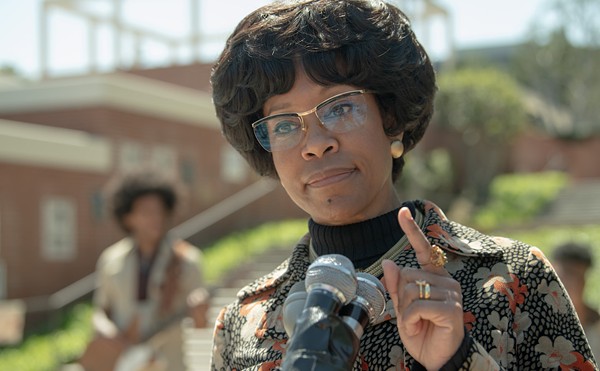Before you click SEND with the hate-mail (or, worse, with the "You said it, brother!" mail), consider that this is the theme of Respiro, an elegant and beautiful new film from Italy. Written and directed by Tisch School of the Arts alum and film festival darling Emanuele Crialese, it's the story of a young woman slowly losing it on the dusty little island of Lampedusa, in the Mediterranean. International beauty Valeria Golino portrays Grazia, a youngish wife and mother of three, whose slightly unconventional habits raise eyebrows and then tempers. Indeed, she cavorts with strangers. She swims naked with her embarrassed young sons. She sings along with Patty Pravo on the radio, for crying out loud! What a wacko!
Anyway, what the movie strives to make us understand is that Grazia is a somewhat delirious dreamer amid oppressive bores. She works in a fish packing plant while her roguish husband Pietro (Vincenzo Amato) accompanies the other fishermen on long hauls. Her teenage daughter Marinella (Veronica D'Agostino) is starting to run the streets of their tiny village, and her sons Pasquale (Francesco Casisa) and Filippo (Filippo Pucillo) cavort with hooligans, fashioning slingshots to inflict maximum damage while avidly participating in the daily, sadistic horrors of boyhood. Life isn't exactly hell for Grazia, but she's a woman-child, "either too happy or too sad" as Pietro's mother puts it, extremely erratic in managing her responsibilities. Her life's drudgery is fast outweighing the arid island's limited provincial charm. Worse, her swoons and flashes of weirdness are prompting persecution.
Crialese has played it very smart in fashioning her film, taking stock of Lampedusa's desolate beauty to inform her characters (many of them played by non-actors) and their motivations. In just the first five minutes, we experience the sea, the dust, the cliffs and crags, the wretched unfinished cinderblock buildings cast about the landscape. In this environment, the boys attack and humiliate each other, and, tellingly, we encounter a low bunker echoing with the cries and yowls of captured stray dogs.
It's not really clear whether or not Crialese has read Clarissa Pinkola Estes' Women Who Run with the Wolves, but it's reasonable to assume that she has some familiarity with the title. While Grazia doesn't specifically embody the "Wild Woman" archetype, she does indeed find close company with the braying hounds, who end up getting her in a spot of trouble with her community. The connection is a bit generalized -- "this woman loves dogs, therefore she has a free spirit" -- but it's functional, and puts Grazia in a very different category than Juliette Binoche liberating the uptight French with her doses of Chocolat.
Watching Respiro is satisfying perhaps because it is so simple, so elemental. The director has classified her project as magical realism and stressed the importance of gestures over dialogue, but this is way off the mark; the movie's much closer to verite, and the characters -- particularly the young kid Filippo -- can't seem to shut up to save their lives. Given Golino's innate intelligence onscreen, it actually takes a while to comprehend that Grazia is first and foremost a sensualist, enjoying a very Italian closeness with her children and environment, all as a connected whole. That her town and her own family can't seem to fathom her immense appreciation of the world around her summons the movie's sadness.
Like many early efforts, Respiro is a little clunky, as if its director is trying to shout down the world for its lack of sensitivity, its cold, mechanical nature, its cruelty (especially toward dogs). Forgive it this, though, and you'll receive a small but grand expression of the beauty of the feminine, which brings everyone together with revised and deepened appreciation. Grazia's message, as a beautiful Everywoman, seems to be this: The flesh is finite, the sea vast; jump in while you can.





